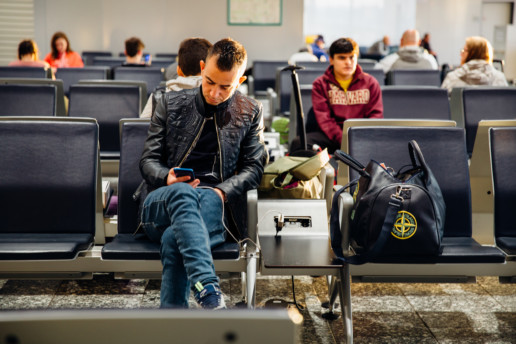Coronavirus Impacts Business Travel
With the Coronavirus being a major discussion for all travelers, many businesses are canceling meetings and events that require traveling. Continue reading this blog post to learn more about how the Coronavirus is impacting business travel.
To go or not to go: As the coronavirus spreads, more and more companies are opting to cancel long-planned conferences and tours, ditching all but the most essential business travel, and even warning employees to rethink their vacation plans or be prepared for an at-home quarantine.
Nestle made news last week when it announced plans to halt all international travel and limit domestic trips, but it was one of many companies to do so. A survey of member companies by the Global Business Travel Association, released Feb. 27, found that 65 percent of the 401 respondents had already cancelled at least a few meetings or events. More than half had nixed international travel to places beyond China, including some European countries. To keep a handle on the rapidly evolving situation, 43 percent of respondents had instituted new trip approval procedures.
"I think the major takeaway is that safety is the main concern for all travelers," said association spokesperson Meghan Henning. "Once companies feel that the virus has been contained, we are confident that travelers will be back on the road."
So far, though, the virus is not contained, and employers are scrambling to keep up. On Feb. 4, National Symphony Orchestra Executive Director Gary Ginstling announced the cancellation of performances in China for an upcoming Asia tour, but he said he was confident the Japan leg would be unaffected. "We'll be there for eight or nine days," he assured the public and NSO musicians. However, only a couple weeks later, on Feb. 28, the Japan tour was eliminated as well.
Should They Stay or Go?
The difference between a reasonable response and overreaction seems to change hourly. How can employers ensure they are making responsible decisions? Management specialists recommend the following:
- Frequently check travel advisories from the Centers for Disease Control and Prevention (CDC) and the World Health Organization (WHO).
- Update internal travel approval procedures to make sure managers know where all employees are traveling.
- Communicate clearly with employees about travel decisions and listen to any concerns they might have.
- Be prepared to be flexible.
Employers are obligated under the Occupational Safety and Health Act to provide a workplace free of known safety and health hazards, and workers have a right to refuse work that they consider to be dangerous under certain circumstances. That could include travel to destinations at risk for the coronavirus.
Beyond that, companies would do well to err on the side of caution, said David Michaels, a professor of public health at George Washington University and assistant secretary of the Occupational Safety and Health Administration (OSHA) for seven years during the Obama administration.
"Every employer has to consider whether or not the risk [of travel] is warranted—not just the destination but the plane trip itself," Michaels said. "It's a moving target right now. If you can avoid [having employees travel] as much as possible, you're going to be better off because when you minimize employee exposure, you improve your ability to function in the long run."
Courtney Harrison, chief human resources officer for San Francisco-based tech company OneLogin, said employee travel decisions are being made there individually, after consulting the CDC and WHO websites. "We are not mandating any restrictions at this point," she said. "We will work on a case-by-case basis with each employee to assess the safest path for that person."
Harrison said one challenge is ensuring the safety of colleagues and customers when an employee returns from a virus-prone area, whether for work or vacation. "[Our policy requires that], when an employee returns from an at-risk geography, they self-quarantine themselves for at least 14 days and they stay in close contact with HR," Harrison said. She noted that the company, which is in the business of providing secure login platforms, is well-positioned for remote work. "It might be the right time to reframe this challenge and use it as an opportunity to learn and practice a new way of working."
When Travel Is Part of the Job
For some, of course, travel is an integral and unavoidable part of the job. Take, for example, flight attendants, who not only travel globally but also interact with passengers along the way. The Association of Flight Attendants (AFA), the union that represents attendants at 20 airlines, has been posting the latest CDC alerts to its website and pushing airlines to provide greater protections and even curtail some flights. "AFA leaders at each airline are working directly with airline management through our contracts and other means to mitigate the impact," the union announced on its website.
The Allied Pilots Association also has been actively monitoring the coronavirus response. In late January, the union filed suit against American Airlines to stop all flights to China and encouraged pilots to refuse to fly there. The following day, American, which had already curtailed some flights to China, announced that all were canceled.
As employers scramble to get ahead of the fast-changing travel landscape, they must also consider when travel bans should end. At this point, that's one of many unanswered questions. The WHO website cautions against indefinite travel bans, saying they "may only be justified at the beginning of an outbreak, as they may allow countries to gain time, even if only a few days, to rapidly implement effective preparedness measures. Such restrictions must be based on a careful risk assessment, be proportionate to the public health risk, be short in duration, and be reconsidered regularly as the situation evolves."
Until then, monitoring public information sites and communicating with employees are key. "Our industry's first priority is the health and safety of the business traveler," said Scott Solombrino, executive director of the Global Business Travel Association, "and our members are being appropriately cautious and proactive in their approach to the situation."
SOURCE: Cleeland, N. (03 March 2020) "Coronavirus Impacts Business Travel" (Web Blog Post). Retrieved from https://www.shrm.org/ResourcesAndTools/hr-topics/employee-relations/Pages/Coronavirus-Grounds-Business-Travel.aspx
10 surprisingly great places to retire in the U.S.
At Saxon, we care about retirement and offering you the best plans. In this article, we take a look at Forbes's list of the top 10 places to retire. Do any of these places sound peaceful to you?
Probably the biggest retirement decision you’ll face (after: Can I ever?) is: Where should I retire? To help, U.S. News has just come out with its first Best Places to Retire in the United States ranking of the 100 largest metropolitan areas. Some of its Top 10 spots will surely surprise you and you may also wonder why certain parts of the country failed to make the cut.

Credit: Shutterstock
“This is a much more comprehensive analysis than we’ve done in the past,” said Emily Brandon, U.S. News senior editor for retirement. “Before, we’ve done themed lists like 10 Places to Retire on Social Security Alone and 10 Retirement Spots With Year-Round Nice Weather.”
How U.S. News Ranked the Best Places to Retire
This time, U.S. News first asked people 45 and older to indicate the “attributes of a retirement destination that are most important to them” and collected responses from 841 of them. “What people told us was most important to them in a place to retire was 'being affordable' but also, they wanted to feel happy there,” said Brandon.
The Top 10
The Top 10 best places to retire in America, according to U.S. News:
- Sarasota, Fla.
- Lancaster, Pa.
- San Antonio, Texas
- Grand Rapids, Mich.
- El Paso, Texas
- McAllen, Texas
- Daytona Beach, Fla.
- Pittsburgh, Pa.
- Austin, Texas
- Washington, D.C.
“Most of the places scored well on some measures, but not on others,” said Brandon.
That’s a fact. Sarasota had high scores for Happiness, Desirability and Retiree Taxes and decent ones in the other categories. McAllen didn’t fare well in the Job Market category and Washington, D.C. got a low ranking for Housing Affordability. El Paso and Grand Rapids were weak in the Desirability category.
Why Places Scored Well and Didn't
The reason four Texas metro areas made it into the Top 10? “Affordable housing, low taxes and above-average levels of happiness,” said Brandon.
The three winners in the Middle Atlantic states (Lancaster, Pittsburgh and Washington, D.C.) had high rankings because of happy residents and access to high quality health care, Brandon noted.
You may have noticed that the Top 10 largely consists of small- and mid-size cities and no California or New York City-area metros. “I think a lot of that has to do with housing prices,” said Brandon. “Almost no California places scored high in the list largely because housing prices are out of reach for many people with low- or even mid-range incomes.” California home prices are 150% above the U..S. average, overall. The highest-ranked California metro area in the U.S. News list is San Diego, which came in at No. 21.
What About the Weather?
Somewhat strangely, the U.S. News ranking didn’t factor in weather at all.
“We had some discussion about whether to include weather,” said Brandon. “It’s tricky because not everyone has the same preferences when it comes to weather. Some people want four seasons. Some find snowy winters terrible.” The upshot: the rankers left out this variable.
How the U.S. News List Compares With Other Rankings
The U.S. News list is markedly different from other recent Best Places to Retire rankings from Forbes and WalletHub.
The 25 places Forbes chose, after looking at 550 communities, were in big and small cities and skewed toward warm and moderate climates; its top places included Clemson, S.C., Port Charlotte, Fla. and Green Valley, Ariz. None of its 25 were in the U.S. News Top 10.
WalletHub looked at the retiree-friendliness of the 150 largest U.S. cities across 40 metrics and its top picks were mostly large ones. Three cities in Florida topped the list: Orlando, Tampa and Miami. Austin was the only one in both WalletHub’s Top 10 and U.S. News’.
What the Rankings Can't Rank
You won’t want to move to any place in retirement just because it’s on a Best Places list, of course. And no ranking can account for a key retirement location criteria for many people: proximity to family members.
Still, Best Places to Retire rankings can be a useful part of your research as long as you closely read their methodology, so you understand what the raters were rating.
“These types of surveys can be a great starting point in deciding where to retire,” said Brandon. “It all comes down to your personal preferences. Your criteria for what makes a best place to retire may be different than for others.”
You can read the original article here.
Source:
Eisenberg R. (2 October 2017). "U.S. News Offers A New Take On The Best Places In The U.S. To Retire" [Web blog post]. Retrieved from address https://www.forbes.com/sites/nextavenue/2017/10/02/u-s-news-offers-a-new-take-on-the-best-places-in-the-u-s-to-retire/#4d26f87c60ec
SaveSave


